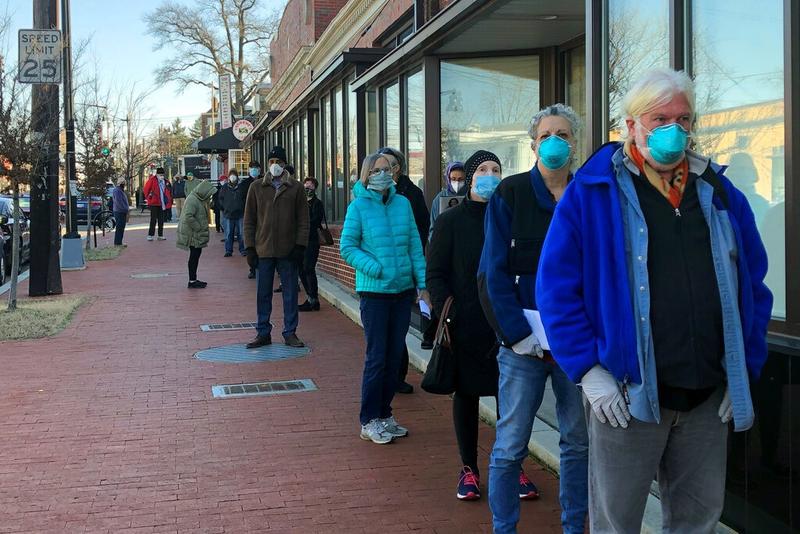Those desperately looking to receive an injection take to the road in many states
 People 65 and older wait outside the Hattie Holmes Senior Wellness Center in Washington, Jan 12, 2021, to get a coronavirus vaccine. (CAROLE FELDMAN / AP)
People 65 and older wait outside the Hattie Holmes Senior Wellness Center in Washington, Jan 12, 2021, to get a coronavirus vaccine. (CAROLE FELDMAN / AP)
COVID-19 inoculation sites across the United States are canceling hundreds of thousands of appointments as they run out of vaccine and are uncertain when they will receive more doses.
Health officials across the US say COVID-19 cases have been dropping steadily across the US, but they are concerned that variants of the virus could cause new surges
Overwhelmed appointment websites are crashing amid confusing eligibility rules in many states, health officials said.
To get an inoculation, thousands of people are traveling, Bloomberg News reported on Saturday, from showing up at beach resorts in Hawaii to ski towns in Colorado and Utah.
Health officials across the US say COVID-19 cases have been dropping steadily across the US, but they are concerned that variants of the virus could cause new surges of cases more quickly than the country is distributing vaccines.
ALSO READ: US toll lays bare scale of virus battle
"We're definitely on a downward slope, but I'm worried that the new variants will throw us a curveball in late February or March," The New York Times quoted Caitlin Rivers, an epidemiologist at the Johns Hopkins Bloomberg School of Public Health, as saying.
On Friday the University of Washington's Institute for Health Metrics and Evaluation, which puts out a predictive model widely used for planning, published a projection saying new cases in the US would decline steadily from now on.
"We've been saying since summer that we thought we'd see a peak in January and I think that, at the national level, we're around the peak," Christopher Murray, director of the institute, told the Times. But Murray cautioned that variants of the virus could "totally change the story".
California health officials said that at current rates it could be June before residents 65 and older are fully vaccinated, and full vaccination in places such as Los Angeles County, the country's most populous, might not be possible until next year.
Paul Simon, chief science officer for the county Department of Public Health, said that if weekly vaccine shipments were to increase to 500,000 doses, the county could potentially immunize 75 percent of its adult population by midsummer. At the current rate, though, he said the "vaccination effort will likely extend well into 2022".
In California, which has been experiencing the worst winter surge in the country, the number of new daily COVID-19 cases keeps declining even as vaccinations remain slow in the most populous state in the country.
Slight decline
On Friday counties reported 24,731 new cases of COVID-19 in California. The state has a seven-day average of 29,122 new daily cases, the lowest average since Dec 11, and almost 35 percent down from a peak on Jan 10.
The number of patients admitted to hospital with COVID-19 has also declined recently, and the number of patients in intensive care unit beds with confirmed cases of COVID-19 has also declined.
The Mayor of New York, Bill de Blasio, wrote a letter on Friday to President Joe Biden requesting more vaccines, and the Governor of New York state, Andrew Cuomo, said the same day the state was running out of vaccines. But on Saturday he said the coming week's supply had begun to arrive from the federal government, and he encouraged minorities to take it.
Anthony Fauci, Biden's chief medical adviser on COVID-19, said on Friday that Johnson& Johnson's single-dose COVID-19 vaccine could be granted emergency approval in just two weeks.
Unlike Pfizer and Moderna vaccines, that vaccine candidate does not have to be kept super-cold, Fauci said.
READ MORE: As US death toll tops 51,000, states move toward reopening
Johnson & Johnson has said it expects to have 100 million doses available by April.
An aggregate forecast from the Centers for Disease Control and Prevention comprising various independent models projects that 465,000 to 508,000 deaths could be reported by Feb 13.
The model by researchers at the University of Washington updated on Friday estimates that the US will report another 168,000 COVID-19 deaths before May, bringing the total to 569,000 deaths.


